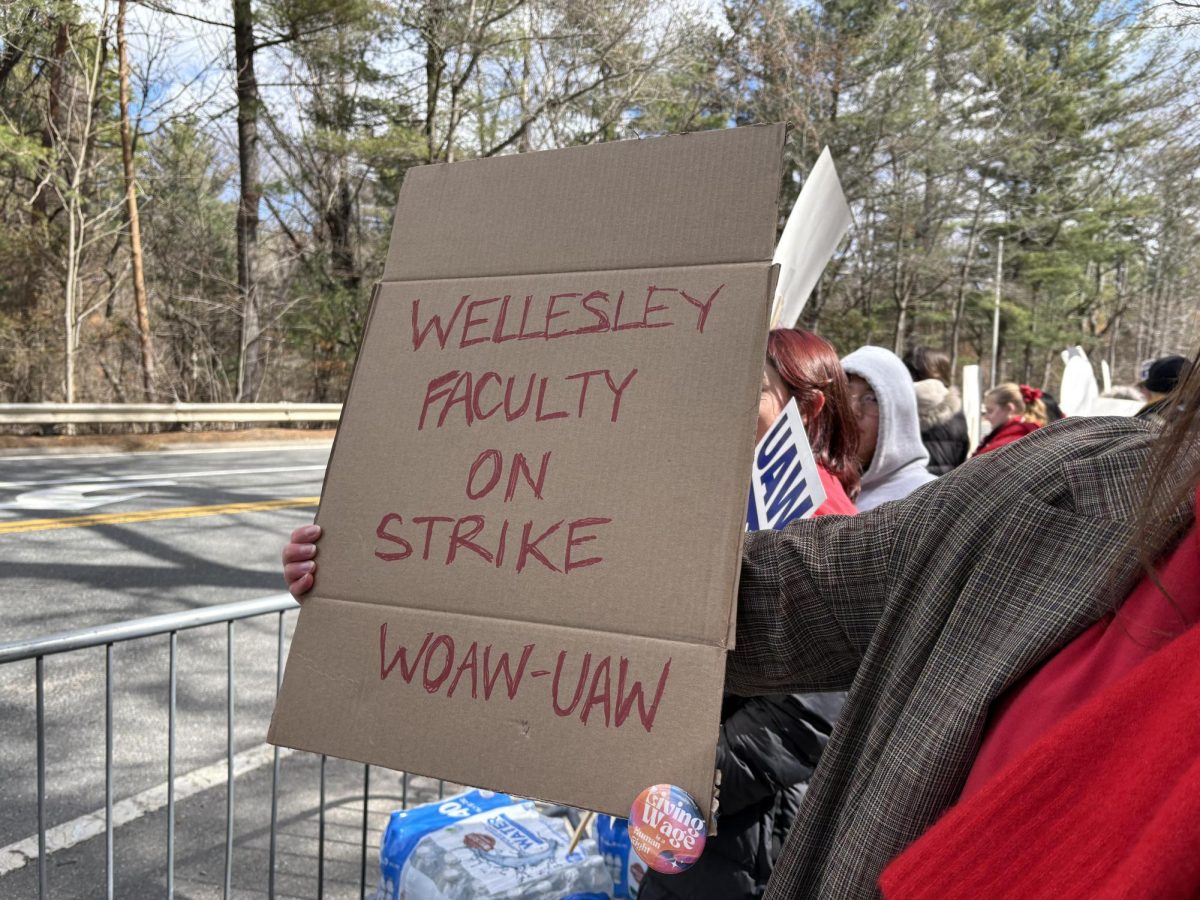Administration at the Massachusetts Institute of Technology suspended a student group, the MIT Coalition Against Apartheid (CAA), on Tuesday, Feb. 13, following a demonstration the group held on Feb. 12.
MIT President Sally Kornbluth announced the suspension in an email sent to members of the MIT community, including cross-registered Wellesley students, which contained a link to a video of her speaking on the matter entitled “Actions related to a student organization.” In the video she declared, “Last night, members of the CAA, the Coalition Against Apartheid, once again conducted a demonstration on campus without going through the normal permission processes that apply to every student group at MIT.”
The demonstration took place at 5 p.m. on Monday, Feb. 12 outside the Student Center, around 24 hours before President Kornbluth’s announcement.
The relationship between the CAA and MIT administration had been contentious for months prior to Feb. 13. Vice Chancellor and Dean for Student Life Suzy M. Nelson had sent a letter to the MIT community on Nov. 8, 2023, titled “Campus safety and policies around protests, postering and free expression” where she stated that anyone planning a vigil, protest, counter-protest or demonstration may not disrupt living, working and learning spaces at MIT, that the only approved protest venues are certain outdoor spaces, and that failure to comply with these regulations will result in referral to the Committee of Discipline (COD).
In her email, President Kornbluth linked a letter to the community from the chancellor and provost posted on Jan. 31, 2024 to refer to as background on MIT’s policies around student organizing. The letter reiterated guidelines covered in the previous letter from Vice Chancellor and Dean for Student Life Nelson, but it added that organizers must meet with MIT officials at least three business days in advance.
The MIT CAA had posted to its Instagram account publicizing the Feb. 12 demonstration, which it referred to as an “Emergency Action.” The student group explained what compelled them to organize so quickly in the caption of the post:
“Last night, Israel began a bombing onslaught of Rafah, where almost 2 million displaced Palestinians from across Gaza have been concentrated. … At MIT, where we do projects for the Israeli Ministry of Defense at the tune of MILLIONS, it begins with ending these ties to the genocidal Israeli forces and sending a clear signal that business will not continue as usual.”
Vice Chancellor and Dean for Student Life Nelson sent a letter to the CAA’s executive officers on Feb. 13 suspending the CAA’s privileges as a recognized student organization, effectively prohibiting it from reserving any space on campus, using MIT facilities, receiving standard funding of student groups, and organizing any further protests or demonstrations on the MIT campus.
The CAA disapproves of these guidelines.
“We feel like these policies are unjust. They go against the nature of a protest. If you do a protest, you want it to be disruptive. You cannot really protest against an entity by following the rules that that entity sets,” said Alejandro Tañón Díaz ’25, a MIT student involved in MIT CAA.
Tañón Díaz added that while MIT CAA did not register their protest, they had an open channel of communication with administration which had been established prior.
Furthermore, in an Instagram post the MIT CAA published on Feb. 16, the organization claimed, “MIT gave us a speaker system to use during the Feb. 12 emergency protest and affirmed their understanding of the urgency of our demonstration for Rafah prior to the protest. … We reached a mutual agreement to collaborate in good faith and as such notified the administration about our Feb. 12 emergency demonstration before the action, offering to work together to ensure safety without compromising the urgency of the situation.”
In the video sent on Feb. 13, President Kornbluth elaborated on the reasoning behind the interim action from the Committee on Discipline (COD).
“I want to be clear that suspending the CAA is not related to the content of their speech. I fully support the right of everyone on our campus to express their views. However, we have clear, reasonable ‘time, place and manner’ policies in place for a good reason,” President Kornbluth said in the video. “The point of these policies is to make sure that members of the MIT community can work, learn and do their research on campus without disruption. We also need to keep the community safe, and we can’t do that without enough advance notice to organize staff and police resources.”
The CAA released a statement later that night demanding MIT to reinstate the CAA and to retract threats of suspension against student organizers.
“Today, the MIT administration suspended the Coalition Against Apartheid for fighting for Palestinian liberation. They have further issued sanction letters to 13 student organizers threatening us with permanent suspension from MIT. For over four months, the MIT administration has continued to silence our voices by applying unjust punitive measures to our actions. We have held peaceful protest after peaceful protest in response to the genocide perpetrated by the Israeli occupation in Palestine,” the CAA said in the statement.
Tañón Díaz shared that the MIT administration has charged individual students who have been active in demonstrating on campus with harassment and discrimination. The charges were similar to those leveled against the student group and required students to undergo institutional processes. Tañón Díaz himself has been suspended from all non-academic activities as a result of his leadership in MIT CAA.
“I am the President of the Association of Puerto Rican Students (APR). The sanctions from MIT that prohibit me from any leadership position prohibit me from fulfilling my role as President of APR and indirectly hurt a whole community on campus.”
Despite Kornbluth’s emphasis that the consequences enacted following past protests are not related to content of speech, many students feel that they represent a larger agenda of suppressing pro-Palestinian voices.
“It is in these moments, when we face the harshest repression, that we know the balance of power is shifting. [The administration’s] response today reveals that MIT fears the mass mobilization of our community, who have remained steadfast with Palestine,” the CAA said in its statement released on Feb. 13.
Tañón Díaz also commented on the timeliness of the administration’s suspension against MIT CAA.
“I wasn’t expecting a sanction after this event. It wasn’t as big as other stuff we’ve done. It kind of shows how pressures on admin have changed in the last couple months. It’s not just MIT. … There was the congressional hearing with Harvard, MIT, UPenn, and Harvard and UPenn both had their presidents resign. So, in some ways, it’s like MIT is the last one standing, and the president is trying hard to keep her spot,” Tañón Díaz continued. “Our individual notice letters that brought us to the institutional process, we got those the day after President Gay from Harvard resigned, so we can see how the decision to sanction us as students is kind of tied to pressure from millionaires and billionaires external to MIT.”
Some students at Wellesley agreed that the suspension of the CAA goes against the values endorsed by many institutions of higher-education.
“Institutions like Wellesley and MIT love to paint themselves as progressive institutions and pride themselves on advocating for free speech, while simultaneously silencing students who participate in peaceful protests. The hypocrisy is infuriating,” Wendy* said. “Even if they violated admin policy, it feels like too heavy of a punishment to shut down an entire club based on it. It feels like they are being reprimanded for things outside of this violation, but admin will not address it directly.”
The suspension for the CAA has caused frustration in students who have noticed a trend of the limitation of pro-Palestinian voices.
“Time and time again we’ve seen the silencing of pro-Palestinian voices on the basis that anything pro-Palestinian must inherently antisemitic. The suspension of the MIT CAA is representative of the unwillingness of society to acknowledge the mass murder of Palestinians and continue silencing the voices of students fighting for [a] ceasefire,” Tryn Fallon ’27 said.
Regardless of restrictions, Tañón Díaz shares actions that students, both at or outside of MIT, can participate in to show support for Palestine.
“Right now, we have the Scientists Against Apartheid pledge that students can sign to show that you are not going to be complicit in this genocide. In another statement we drafted, urging other organizations to sign onto, we asked MIT three things: [first is to] reinstate CAA as student org, second is to retract threats against student leaders and third is to remove the unjust protest policies.”
Additionally, MIT student organizations have the privilege of hosting websites for their organization using the mit.edu web domain. However, as of Mar. 5, MIT has revoked MIT CAA’s web domain.
On CAA’s decision to hold their latest demonstration, Tañón Díaz responded, “Urgency is [of] the highest magnitude. We need to act immediately. In a genocide, three days is countless lives lost.”
*This student’s name has been replaced with a pseudonym to maintain anonymity and protect the student from harassment.




